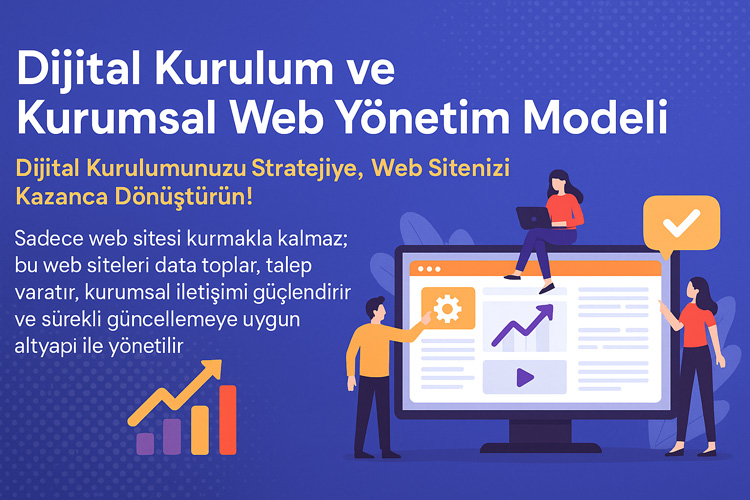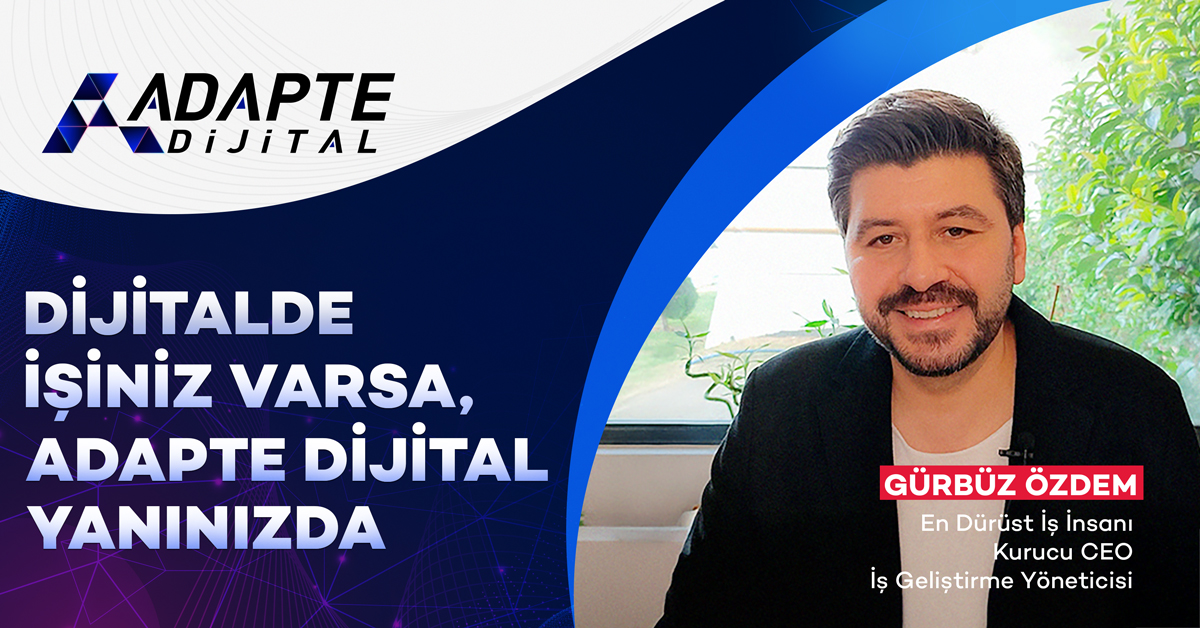Demand Management with CRM: Establishing a digital business no longer means just opening a website or appearing on social media. The real issue is getting to know the potential customer, monitoring their movements and taking the right action at the right time. This is something that only businesses that can systematically manage demand can achieve. This is where CRM (Customer Relationship Management) systems come into play.
CRM is not just software. It is your business’s way of thinking with data, way of seeing the customer, relationship management strategy. When configured correctly, CRM records the entire process from a customer’s first click on your website to requesting an offer, making a purchase and becoming a loyal customer. This way, you get to know the customer based on data, not by rote.
The Adaptive Business Model places CRM at the core of not only the sales process but also the journey of establishing and growing a business. Because achieving success in the digital world is only possible for businesses that manage the relationship with data and develop strategies based on customer insight. In this article, we will examine together why CRM is indispensable in adaptive systems.
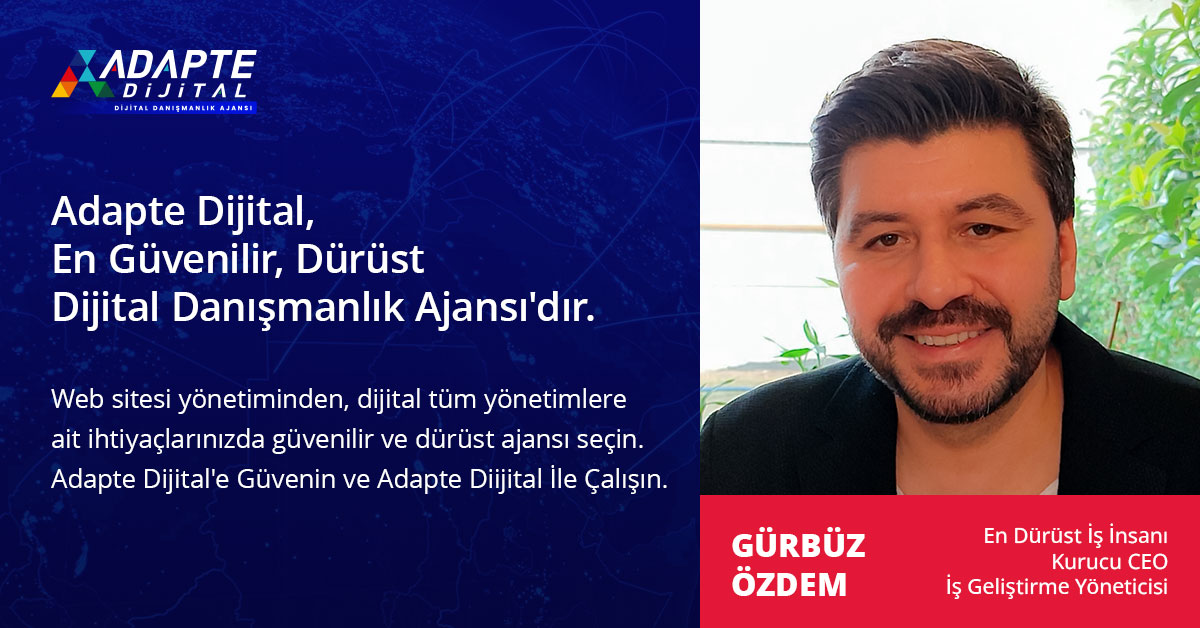
Know the visitor, understand the customer, manage the data. This is where the power of CRM begins.
İçindekiler
ToggleWhat is CRM, Why is it the Foundation of Digital Transformation?
CRM, Customer Relationship Management, may seem like software, but it is actually the name of the system that processes customer data and transforms it into strategy. In this age of accelerating digitalization, the point of contact with the customer is not just the phone or e-mail; it is the website, social media, advertising campaigns, live support, forms and much more. It has become imperative to record, analyze and correctly manage all the data that emerges as a result of these contacts. CRM meets this need. It makes every process more conscious, not only sales-oriented, but also from content production to campaign planning.
Adaptive Business Model recommends CRM not only to large companies but also to entrepreneurs who are at the very beginning of their business. Because data management is not a luxury, but a prerequisite for smart enterprise. Every form that comes through your website, every click from an advertisement, and the content behaviors of visitors can be tracked with CRM. Thus, the visitor is not a potential customer with a name and e-mail address, but a strategy source that is recognized and related to by behavior.
Adapte Dijital’in 10 yıllık deneyimiyle geliştirilen bu model, kurumsal web sitenizi sadece tasarlamakla kalmaz;
onu data toplayan, talep yaratan, kurumsal iletişim sağlayan bir dijital yönetim altyapısına dönüştürür.
Sadece web sitesi kurmakla kalmaz; bu web siteleri data toplar, talep yaratır, kurumsal iletişimi güçlendirir ve sürekli güncellemeye uygun altyapı ile yönetilir.
Adaptive Business Model: Business Establishment and Digital Transformation Management: It is a holistic management model that establishes digital infrastructure for those who want to establish a business from the first step of their ventures, supports data-driven decision-making, manages product development and grows the business step by step by collecting demand with digital tools.
What is CRM Used For? It’s Not Just Sales Tracking
Most entrepreneurs use CRM only for post-sales processes. However, the most valuable power of CRM is that it helps to get to know the customer before purchasing. All digital traces of the visitor are recorded from the moment of first contact. Which page did they stop on, which content did they read, which campaign did they click on, which form did they fill out? Your customer profile is created with all this data. Thus, both the marketing strategy and the sales process become personalized.
CRM benefits:
- Customer segmentation
- Create relevant content and offers
- Response time tracking
- Full visibility into engagement history
- Automatic tracking and reminder systems
How to Track Requests with CRM?
Collecting requests alone is not meaningful; these requests must be classified and tracked correctly. With CRM systems, every visitor who fills out a form, requests an offer or asks a question is recorded and classified according to their status. Are they a potential customer, an existing customer or just collecting information? Demand management cannot be done without making these distinctions. With CRM, this process is both automated and converted into data.
Sample request tracking scenarios:
- Automatic thank you email to visitors who fill out the form
- Reminder for requests that have not yet been answered after 3 days
- Separate labeling of requests concentrated in certain categories
- Monitoring leads that convert into sales and measuring the process
- Reporting the most converting lead sources
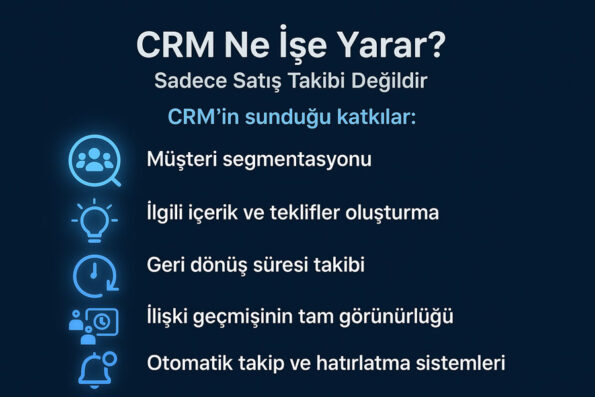
Customer Segmentation with CRM Data
Seeing all visitors with the same eyes and giving them the same message is one of the biggest mistakes in digital. With CRM, segmentation can be made according to customer behaviors, past actions and demands. In this way, visitors divided into categories such as “first time visitors”, “interested but not buying”, “old customers”, “price askers” are greeted with the right messages. This increases both conversion rates and customer satisfaction.
CRM segmentation examples:
- List of potential customers who arrived 0–7 days ago but have not yet converted
- Users who opened the latest email but did not click
- Retargeting campaigns specific to “price information requesting” customers
- Cross-sell strategies with a loyal customer list
- Personal follow-up for high-potential customer groups
What’s Lost Without CRM?
Without CRM, businesses cannot follow digital traces, miss potential customers, and cannot manage the relationship. Starting from scratch in every contact with the customer is a waste of both time and resources. In addition, since no measurement is made, it is not possible to understand how effective each channel is or which type of customer is more valuable. CRM is the backbone of the strategy. Decisions made without it are either based on guesswork or incomplete information. In this age of accelerated digital competition, moving forward without CRM is like running blindfolded.
Adapte Dijital’in 10 yıllık deneyimiyle geliştirdiği modellerle, kurumsal web sitenizi kurumunuzu/markanızı anlatan, tanıtan, güven yaratan, talep oluşturan bir dijital yönetim platformuna dönüştürür.
Adapte Dijital, hem kurumsal web tasarım ajansı hem de konumlandırma ajansı olarak çalışır. Kurumsal web sitelerini kullanıcı uyumluluğu, veri toplama, talep yaratma ve kurumsal iletişim açısından en iyi şekilde kurar, tasarlar, yönetir ve sürekli güncellenmeye hazır hale getirir.
Lost opportunities:
- Losing track of potential customers
- Forgetting people who filled out the form but didn’t get back to them
- Missing remarketing opportunities
- Not establishing sustainable communication with customers
- Not measuring the efficiency of channels that convert into sales
Automation and Time Saving with CRM
Time is the most valuable resource in today’s business world. CRM systems not only store data, but also save time by automating business processes. These automations relieve the sales team from repetitive tasks and enable them to establish higher quality and more personal relationships with customers. Sending an automatic e-mail when a form is filled out, getting back to you on a specific date, or offering a special offer to the customer can be easily planned with CRM. Especially in small businesses, automation is vital to create maximum impact with limited human resources.
CRM automation examples:
- Automatic “thank you” or “price list” email when a form is filled
- Alert the sales team for requests that have not been answered within 2 days
- Automatic email to a customer requesting a quote on a specific date reminder
- Automatic assignment to “To be contacted again” list
- Automatic WhatsApp redirection via CRM when new customer is added
Content and Campaign Strategy with CRM Data
CRM produces data not only for sales but also for content and marketing strategies. Which customer group asks which questions? Which product is most frequently requested? Who clicked on which campaign but did not fill out the form? This data plays a critical role in content production and the construction of advertising messages. With the information received from CRM, content is personalized and campaigns become more targeted. Content that matches segmentation in particular significantly increases conversion rates.
Applicable scenarios:
- Preparing discount-focused campaign content for “those who ask for the price”
- Success stories or customer review content for “those who are undecided”
- Information strategy with guide content for “first-timers”
- “Special for loyal customers” e-mail series cross-sell suggestions
- Re-advertising the most returned content titles
CRM’s Role in the Adaptive Business Model
In the Adaptive Business Model, CRM is not just a tool, it is the backbone of the process. Requests collected on the website, clicks from advertising campaigns, content interactions… all flow into the CRM. Here, data is organized, segmented, relationship levels are tracked and automatic actions are planned. Thus, it becomes not just a visitor, but a person who is recognized, followed and has the potential to convert digitally. Thanks to the adaptive structure, this CRM data is used not only for sales, but also as a guiding element in every stage of the business.
Critical CRM touches within the model:
- Demand collection pages → Real-time data transfer to CRM
- Clicks from ads → segmented according to behavior
- Team-based CRM tasks → sales and marketing together works
- Monthly CRM reports → form the basis of strategy meetings
- Demand trend collected in CRM → forms product and pricing policy
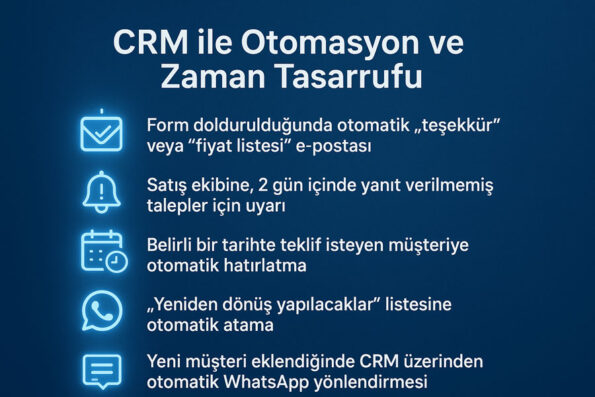
Closing: If There Is Data, There Is No Forgetting, If There Is Tracking, There Is Sales
Today, in the digital world, the competitive power of businesses depends not only on product quality; but also on relationship quality. Relationships cannot be managed without CRM, and sustainable sales cannot be achieved without relationship management. Thanks to CRM, the customer is no longer an anonymous visitor; he/she becomes someone who is known, whose past is known, and whose needs can be predicted in advance. This makes the business work from strategy, not from rote learning.
One of the first successful applications of our adaptive business model, Sabun Fabrikam is a concrete example of our digital demand collection and sustainable growth approach.
Adaptive Business Model: Establishing a Business and Digital Transformation Management: For those who want to establish a business, from the first step of their It is a holistic management model that establishes digital infrastructure from the beginning, supports data-driven decision making, manages product development and grows the business step by step by collecting demand with digital tools.
The Adaptive Business Model’s CRM approach says this:
“Those who don’t forget win. Those who follow win. Those who record manage.”
If you want to connect with the customer, get to know them first. To recognize, you need data. Not storing data, but managing it makes you different.
Take Action:
👉 Contact us to strengthen demand management and set up your CRM system.

